Eczema in African Adults: Causes, Types and Symptoms
By: Foluke Akinwalere. Freelance Health Writer. With medical review and editorial support by the DLHA Team.
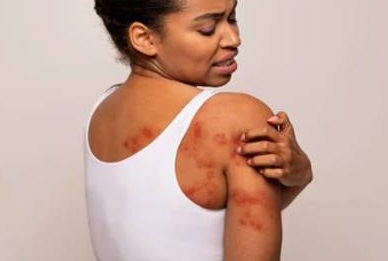
A black African lady with seborrheic dermatitis on the back of chest. Credit Depositphotos
Eczema, one of the common skin diseases in Africa, is characterised by inflammation, itching, and redness, and affects millions of individuals worldwide.
This article delves into more specific information about eczema in African adults, exploring its causes, types, and symptoms. Understanding eczema is important for effective management and treatment, as it can significantly impact your quality of life.
Eczema is the name used to describe a group of inflammatory skin conditions that cause dry, itchy skin, rashes, scaly patches, blisters, and skin infections. This dermatitis (skin disorder) condition can begin during childhood, adolescence, or adulthood. It is a chronic skin disorder that manifests in various forms, ranging from mild irritation to severe inflammation.
It is a part of the triad referred to as the ‘Atopic March’ which describes the connection between patients with atopic dermatitis, asthma, and allergic rhinitis. About 50% of patients with severe atopic dermatitis will also develop asthma, and 75% will develop allergic rhinitis. [1]
Eczema affects millions of people worldwide, including African adults. It affects approximately 20% of children and 3% of adults, with a rising global prevalence. In Africa, the prevalence ranges from 4.7% to 23%. It usually begins between 2 and 6 months of age but can occur at any time. While it was once thought to resolve by adulthood, evidence now suggests it can persist into adulthood. [2]
In Africa, cultural and environmental factors play a crucial role in influencing eczema prevalence among African adults. Factors such as climate, access to healthcare, and cultural practices contribute to variation in the presentation and management of eczema.
Beyond its physical symptoms, eczema can profoundly impact the quality of life of African adults. Persistent itching, discomfort, and visible skin changes can lead to emotional distress, social stigma, and decreased self-esteem.
Understanding the impact of, and how common eczema is in African adults, are essential for developing tailored interventions and support systems.
Eczema is mainly caused by a combination of:
If you have a family history of eczema, dermatitis, asthma, hay fever, and/or allergies, you are more likely to develop this skin condition.
“There’s a very strong genetic component to this disease. When someone has eczema, there is almost always a family history of the disease,” said Dr. Jeff Yu, Assistant Professor of Dermatology at Massachusetts General Hospital.[3] According to Dr. Yu, if both parents have a history of eczema, there’s a 50% chance their child will have eczema too.
For example, living in extreme environmental conditions, such as cold and damp or hot and humid places can trigger eczema flare-ups. Similarly, certain seasons, such as hot and sweaty can also worsen eczema symptoms.
Some common household products are also potential irritants and can cause allergic reactions leading to an eczema flare, for example:
Other factors that can cause eczema are:
Food allergies and sensitivities may contribute to eczema manifestation. If you have food allergies, then one of the reasons why you must avoid that food is that it may cause or worsen your eczema symptoms.
When an irritant or allergen from outside or inside your body triggers your immune system, it causes inflammation on the surface of your skin, leading to a flare-up. This inflammation is responsible for the typical symptoms of eczema in skin folds and areas where skin rubs together.
Socioeconomic factors can also influence the development and worsen eczema. Stress, limited access to healthcare, and challenges in managing the condition due to financial constraints can act as emotional triggers that worsen the symptoms of eczema in African adults.
Understanding the various types of eczema affecting African adults is essential for accurate diagnosis and effective management. There are seven types of eczema.
1. Atopic Dermatitis
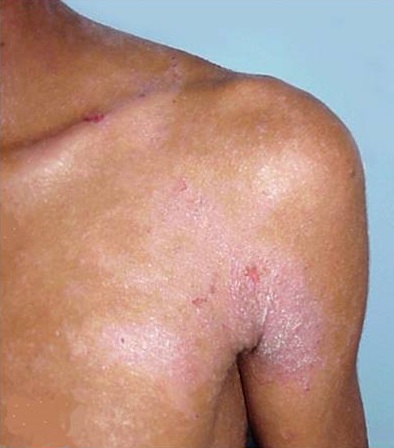
A black African man with atopic dermatitis on the front of chest, left shoulder and upper arm
Atopic dermatitis is the most common type of eczema caused by an overactive immune system that causes the skin barrier to become dry and itchy. It is characterised by dry, itchy, and scaly skin. Atopic dermatitis is not contagious. While it is accepted that atopic dermatitis is a particular problem in children, the burden of the disease is significant in adults. [4]
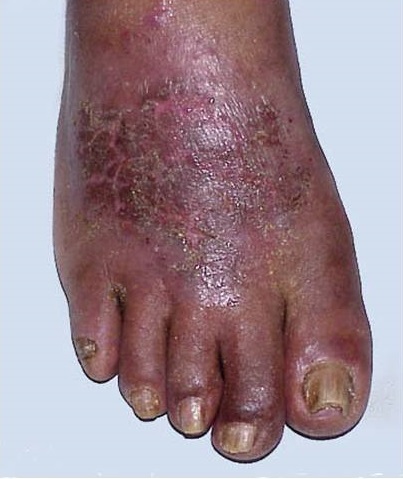
Contact dermatitis in the front of the right foot of a black African man
Contact dermatitis occurs when your skin comes into contact with an irritant or allergen in your environment that causes an itchy rash, redness, and sometimes blistering. Common triggers include chemicals, plants, organisms, or metals that irritate your skin.
Scratching your rash could break open your skin and cause a wound that will look red and crusty and may be painful or leak pus if you become infected. You can have it on your face, hands, genital, armpit, legs, or anywhere that your skin comes in contact with the allergen or irritants.
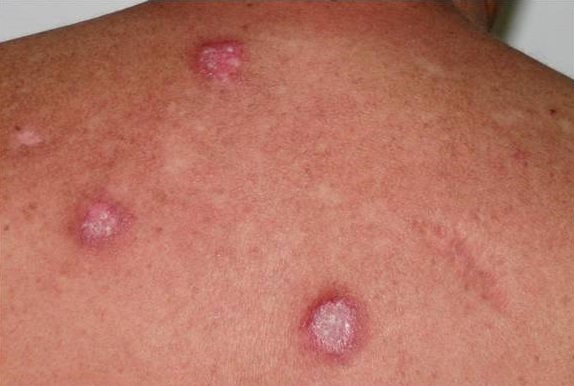
Nummular (Discoid) eczema in the upper back of a black African woman
Nummular eczema, also called discoid eczema, is a type of eczema caused by raised, coin-shaped patches or irritation on your skin that can be itchy, scaly, and crusty, sometimes with ooze of clear fluid. It often occurs on the arms, legs, or torso and may be triggered by dry skin, injury, or stress.
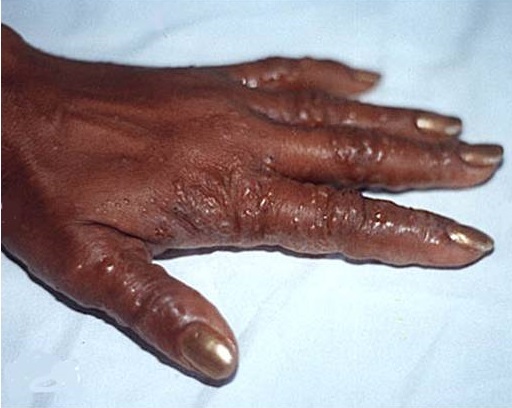
Dyshidrotic eczema on the back of the left hand of an African lady
Dyshidrotic eczema, also known as pompholyx, affects the hands and feet, causing small blisters to develop on the palms, fingers, and soles of the feet. It can be intensively itchy. Dyshidrotic eczema is triggered by factors such as stress, allergies, or exposure to certain metals.
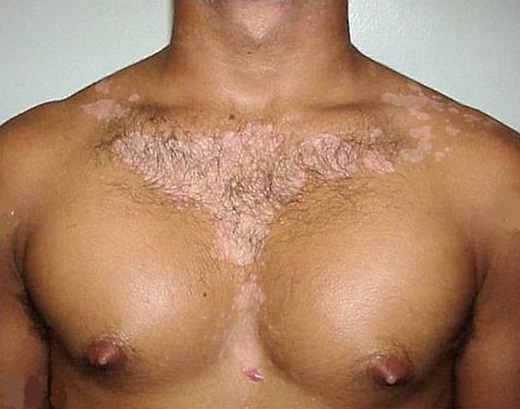
Appearance of Seborrheic eczema on the upper front chest of a black African woman
Seborrheic Dermatitis is a type of eczema that primarily affects areas of the skin that are rich in sebaceous (oil-producing) glands, such as the face, scalp, and chest. These are the most common areas involved in adults that have seborrheic dermatitis with around 88%, 70%, and 27% of cases developing lesions in these areas respectively. [5]
Seborrheic dermatitis is characterised by brown-gray, scaling, and greasy patches of skin. Hormonal changes or certain medications may worsen it. If it develops in infants, it is commonly called a "cradle cap", and it does not reappear again. However, it is most likely an ongoing issue in adults.
This condition is likely caused by an overgrowth of Malassezia yeast (a substance normally found in the skin) that triggers inflammation, causing changes in the skin.
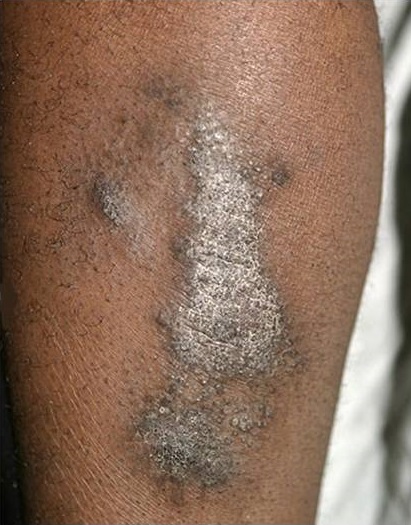
Neurodermatitis of the front of knee and upper leg in a black African man
Neurodermatitis is characterised by thick, scaly patches of skin that develop in response to repeated scratching or rubbing. It often occurs in localised areas, such as the neck, wrists, or ankles. Neurodermatitis may be triggered by stress or psychological factors.
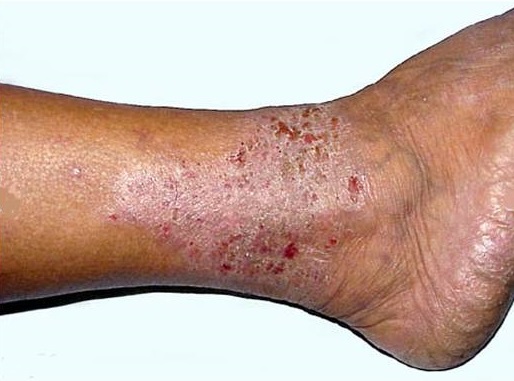
Stasis dermatitis of the right ankle of a black African woman
Stasis dermatitis occurs when there is poor circulation in the legs, leading to swelling, redness, and itchy skin. It often occurs in individuals with conditions such as varicose veins or heart failure. Stasis dermatitis may be worsened by standing or sitting for long periods.
Eczema manifests in several distinctive symptoms, which can vary in severity and presentation among African adults.
Itching: One of the hallmark symptoms of eczema is itching, medically termed pruritus, which can range from mild to intense and significantly impact daily life.
Dry and Inflamed skin: Affected persons often experience dry and inflamed patches of skin, which may appear in localised areas or spread across larger regions of the body. These patches can be accompanied by a sensation of tightness or discomfort and may worsen with scratching.
Appearance: Inflamed skin appears darker brown, purple, or grey on brown or black skin, and may be more difficult to see on brown and black skin.
Cracked and thickened skin: In more severe cases, the skin may become cracked, thickened, or leathery in texture, particularly in areas prone to friction or repeated irritation.
Fluid production: Additionally, eczema lesions may ooze fluid or develop crusts, which further contribute to discomfort and potential infection risk.
Recognising these symptoms is important for prompt diagnosis and management of eczema in African Adults.
In African communities, traditional beliefs and practices often influence perceptions and management of health conditions, including eczema. Some may view eczema through a lens of traditional medicine or spirituality, attributing its cause to supernatural forces or ancestral spirits. Consequently, affected persons may seek alternative treatments or hesitate to disclose their condition due to fear of stigma.
The stigma surrounding skin conditions, including eczema, is prevalent in many African communities. Misconceptions about its contagiousness or association with poor hygiene can lead to social isolation and discrimination against those affected. This stigma may further worsen feelings of shame or embarrassment, hindering individuals from seeking medical care or openly discussing their experiences.
This can affect relationships, cause difficulties in finding a job, and bring about loneliness, low self-esteem, and stress. [6] The stigma around eczema can come from various sources, including family members, friends, peers, societal norms, and even yourself.
Education and awareness raising play important roles in challenging cultural misconceptions and reducing the stigma surrounding eczema in African communities.
The complex interplay of factors contributing to eczema in African adults has been explored. From family history to environmental triggers and cultural influences, the multifaceted nature of eczema and its impact on individuals within African communities has been uncovered.
By recognising the various types and symptoms of eczema, as well as the cultural considerations and stigma surrounding the condition, we can take proactive steps toward improving awareness, research, and support for eczema in this population.
Is Eczema contagious?
No, eczema is not contagious. It is a non-infectious condition.
What are the common triggers for eczema flare-ups in the African?
Common triggers include certain foods, environmental factors (such as hot and humid weather conditions, pollen or pet dander), stress, harsh soaps or detergents.
Does eczema only affect certain age groups?
No. Eczema can affect people of all ages, from infants to adults. However, it is commonly diagnosed in children.
Is there a link between eczema and allergies?
Yes, eczema is often associated with other allergic conditions, such as asthma and allergic rhinitis.
Can stress make eczema worse?
Yes, stress is known to worsen eczema symptoms in some people.
Is there a link between diet and eczema?
Some people may find that certain foods can trigger eczema flare-ups. Keeping a food diary and working with a healthcare professional to identify and eliminate potential triggers from the diet may be helpful.
Can eczema affect my quality of life?
Yes, eczema can significantly impact a person’s quality of life due to its symptoms, which can be physically uncomfortable and emotionally distressing. However, with proper management and support, many people with eczema can lead fulfilling lives.
1. Nemeth V, Evans J. Eczema. In: StatPearls [Internet]. Treasure Island (FL): StatPearls Publishing. [Updated 2022 Aug 8]. Accessed February 16, 2024 Available from here.
2. Sendrasoa FA, Ranaivo IM, Razanakoto NH et al. Epidemiology and associated factors of atopic dermatitis in Malagasy children. Allergy Asthma Clin Immunol 16, 4 (2020). doi: 10.1186/s13223-019-0398-2. Available from here.
3. Nelson S. Eczema Isn’t Contagious, But You Might Have Your Parents to Thank If You Have It. National Eczema Association. [Internet]. Oct. 6, 2022. Accessed February 16, 2024. Available from here.
4. Todd, G. Epidemiology of atopic dermatitis. S. Afr Med. J. (2014). 104(10):710. DOI:10.7196/SAMJ.8843. Available from here.
5. Tucker D, Masood S. Seborrheic Dermatitis. In: StatPearls [Internet]. Treasure Island (FL): StatPearls Publishing. [Updated 2023 Feb 16]. Accessed Feb. 16, 2024 Available from here.
6. Hang L, Saint Aroman M, Taieb C, Baissac C, Merhand S. The impact of eczema involving visible areas of the skin on patients’ quality of life. JEADV Clinical Practice. 2022;1(2):105-110. doi:10.1002/jvc2.20. Available from here.
Related: 5 Common skin diseases in Africa
Published: February 22, 2024
© 2024. Datelinehealth Africa Inc. All rights reserved.
Permission is given to copy, use and share content freely for non-commercial purposes without alteration or modification and subject to attribution as to source.
DATELINEHEALTH AFRICA INC., is a digital publisher for informational and educational purposes and does not offer personal medical care and advice. If you have a medical problem needing routine or emergency attention, call your doctor or local emergency services immediately, or visit the nearest emergency room or the nearest hospital. You should consult your professional healthcare provider before starting any nutrition, diet, exercise, fitness, medical or wellness program mentioned or referenced in the DatelinehealthAfrica website. Click here for more disclaimer notice.